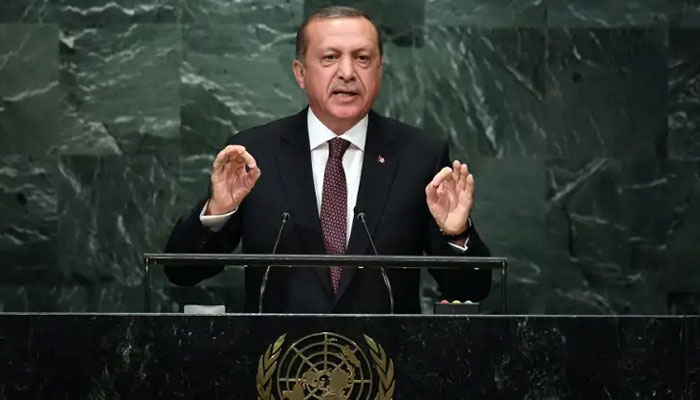Kashmir a ‘burning issue’, Erdogan tells world leaders
UNITED NATIONS: Turkey told the UN General Assembly on Tuesday that the Kashmir dispute between India and Pakistan was a "burning issue", and called for resolving it through dialogue.
"The Kashmir conflict, which is also key to the stability and peace of South Asia, is still a burning issue," Turkish President Recep Tayyip Erdogan said in a speech he made via video-link to the 193-member Assembly’s landmark 75th session.
"Steps taken following the abolition of the special status of Jammu-Kashmir further complicated the problem," he said, referringto the August 5, 2019, unilateral move by India to annex the disputed territory.
"We are in favour of solving this issue through dialogue, within the framework of the United Nations resolutions and especially in line with the expectations of the people of Kashmir," the Turkish leader added.
The Kashmir dispute is on the agenda of the UN Security Council, which has adopted at least 11 resolutions since 1948 that call for an impartial plebiscite to determine the wishes of the people in the disputed state.
On Sunday, the OIC Contact Group on Jammu and Kashmir, which met in New York, voiced "deep concern" over the continued human rights violations by India in occupied Kashmir, and called on UN Secretary-General Antonio Guterres, the Security Council and the Human Rights Council to take steps to end those abuses.
Meanwhile, President Recep Tayyip Erdogan Tuesday called for "sincere" dialogue to settle the growing row with Greece over Ankara´s energy search in the eastern Mediterranean, rejecting any "harassment" by the West over the issue. "Our priority is to settle disputes with sincere dialogue, based on international law and on an equitable basis," Erdogan said in an address to the United Nations General Assembly via video-conference. "However, I would like to clearly state that we will never tolerate any imposition, harassment, or attack in the opposite direction."
Nato allies Turkey and Greece are embroiled in a row over a maritime gas drilling dispute that has pitted Ankara against other EU member states. Tensions spiked after Ankara deployed last month a research vessel in the contested waters between the islands of Cyprus and Crete, but it was pulled back to shore recently in order to give a chance to diplomacy.
Erdogan said Turkey "cannot turn a blind eye" to the violation of its rights and repeated Ankara´s call for "establishing dialogue and cooperation between coastal countries of the eastern Mediterranean." "For this purpose, we would like to propose the convening of a regional conference, including Turkish Cypriots, in which the rights and interests of all the countries of the region are considered."
The Turkish leader also criticized without naming them "countries that have declared their intention to open embassies in Jerusalem, in violation of United Nations resolutions and international law", accusing them of making the conflict "more complicated" to resolve.
Erdogan, a pious Muslim, is a strong advocate of Palestinian rights who has frequently criticized Israeli policies in the West Bank. "Participation of some countries of the region in this game does not mean anything beyond serving Israel´s efforts to erode basic international parameters," he said in a veiled reference to the Gulf states of the United Arab Emirates and Bahrain who have recently normalised their relations with Israel.
-
 Kylie Jenner Reveals Real Story Behind Her 'The Moment' Casting
Kylie Jenner Reveals Real Story Behind Her 'The Moment' Casting -
 Halsey Marks Fiancé Avan Jogia's Birthday With Emotional Note
Halsey Marks Fiancé Avan Jogia's Birthday With Emotional Note -
 China: Stunning Drone Show Lights Up Night Sky Ahead Of Spring Festival 2026
China: Stunning Drone Show Lights Up Night Sky Ahead Of Spring Festival 2026 -
 Andrew's Epstein Scandal: Will King Charles Abdicate Following King Edward's Footsteps?
Andrew's Epstein Scandal: Will King Charles Abdicate Following King Edward's Footsteps? -
 Billy Joel Leaves Loved Ones Worried With His 'dangerous' Comeback
Billy Joel Leaves Loved Ones Worried With His 'dangerous' Comeback -
 Prince William Dodges Humiliating Question In Saudi Arabia
Prince William Dodges Humiliating Question In Saudi Arabia -
 Dax Shepard Describes 'peaceful' Feeling During Near-fatal Crash
Dax Shepard Describes 'peaceful' Feeling During Near-fatal Crash -
 Steve Martin Says THIS Film Has His Most Funny Scene
Steve Martin Says THIS Film Has His Most Funny Scene -
 Kensington Palace Shares Update As Prince William Continues Saudi Arabia Visit
Kensington Palace Shares Update As Prince William Continues Saudi Arabia Visit -
 Fugitive Crypto Scammer Jailed For 20 Years In $73m Global Fraud
Fugitive Crypto Scammer Jailed For 20 Years In $73m Global Fraud -
 Will Andrew Mountbatten-Windsor Finally Go To Jail Now That King Charles Has Spoken Out? Expert Answers
Will Andrew Mountbatten-Windsor Finally Go To Jail Now That King Charles Has Spoken Out? Expert Answers -
 Melissa McCarthy Reveals Her Tried And Tested ‘corpse’ Night Time Routine That’s Lost Her 95lbs
Melissa McCarthy Reveals Her Tried And Tested ‘corpse’ Night Time Routine That’s Lost Her 95lbs -
 Horrifying Pictures Of The Kidnapper Of Savannah Guthrie's Mother Released
Horrifying Pictures Of The Kidnapper Of Savannah Guthrie's Mother Released -
 Andrew's Ex-girlfriend Launches Brazen Attack On Epstein Victims On Piers Morgan Show
Andrew's Ex-girlfriend Launches Brazen Attack On Epstein Victims On Piers Morgan Show -
 Andrew Mountbatten-Windsor 'on His Own' As Palace Gives Green Light To Law Enforcement
Andrew Mountbatten-Windsor 'on His Own' As Palace Gives Green Light To Law Enforcement -
 Kanye West's Tweet About Super Bowl Halftime Resurfaced After Bad Bunny's Show
Kanye West's Tweet About Super Bowl Halftime Resurfaced After Bad Bunny's Show




